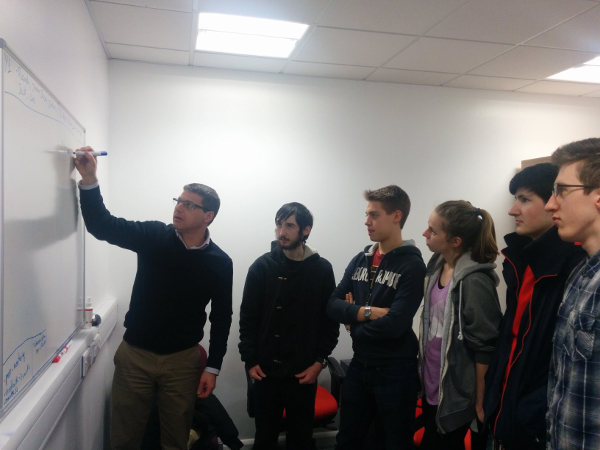Fabio Nemetz, Computer Science, Director of Studies
In the Department of Computer Science, we introduced agile mini, stand-up meetings between the Director of Studies (DoS) and the student representatives. The idea is very simple: between SSLCs, separate short informal meetings are held with each year group’s student reps separately.
The main benefit is that reps don’t need to wait for SSLCs to introduce their issues. If problems are minor, solutions can be suggested that can be implemented quickly, or we place an item for the next SSLC. This enables the SSLCs to concentrate on more major issues and for reps to raise issues they would otherwise feel too minor or not timely for the SSLCs themselves. This can however in turn resolve issues quickly before they become major and and the structure could help to potentially save time overall.
The Mini-SSLC
The meetings are short, standing up and based around whiteboard with the following guide rules:
- Each meeting lasts for 15mins (max)
- We don’t waste our time
- We come prepared
- We focus on the top priorities
The fact that we stand up gives us the sense of urgency. The whiteboard is used by the Director of Studies to take notes that are visible to all. At the end of the meeting a picture is taken and emailed to the reps. Updates on issues raised are also emailed to the reps.

Experience and feedback
The broad idea for these meetings came from an external examiner in a recent Degree Scheme Review which was suggested to the SSLC chair and adapted to the agile format meeting described above by the Directors of Studies (John Power and Fabio Nemetz) and implemented with a pilot in 2015/16.
They have been an ideal format for minor issues, and for discovering items for the SSLC. The chair of the SSLC, a final year student, attended these meetings and was positively impressed with how they provided agility and benefits:
“Any initial reluctance to commit extra time by the students to these meetings was quickly swamped with the successful results of their running.” – Freya Johnson, SSLC chair
The reps have provided additional written feedback with the following key points:
- Students are able to raise current smaller matters to be resolved quickly and efficiently.
- Students are more willing to speak in the informal small group, rather than the formal SSLC (particularly again on smaller issues).
- The mini-SSLCs have a positive impact on the main SSLC, enabling time for bigger issues there. Rather than a threat to the main SSLC, they enhance it.
- Brief well attended sessions are important, so the frequency needs thought: weekly was too frequent.
- Excellent way to ‘close the feedback loop’ and encourages a strong relationship between students and the Director of Studies.
The reps were keen to continue with the mini-SSLCs and recommend them to other departments.
Future considerations
The main issue we still need to agree is the frequency. Suggestions include 2 mini-meetings between SSLCs, fortnightly, drop-in, or when there is demand from students. As the idea is new, the concept and ‘rules’ need time to become understood by all involved and the frequency decided by group after piloting. As the concept is agile in nature, it can be adapted as required for a particular set of reps and their context.
“I would recommend other departments at least trialling this idea, the students really benefit from it and it only takes a 15 minute stand-up per week or even fortnight for it to happen.” – Freya Johnson, SSLC chair
Note: at the SU’s Academic Rep Awards 15/16
- Computer Science won the “SSLC of the year” award
- Fabio Nemetz won the “Overall Above and Beyond” award
- Freya Johnson won the “Outstanding Contribution; Academic Rep” award